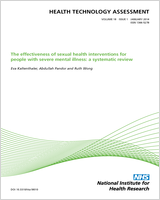Included under terms of UK Non-commercial Government License.
NCBI Bookshelf. A service of the National Library of Medicine, National Institutes of Health.
Soares MO, Welton NJ, Harrison DA, et al. An Evaluation of the Feasibility, Cost and Value of Information of a Multicentre Randomised Controlled Trial of Intravenous Immunoglobulin for Sepsis (Severe Sepsis and Septic Shock): Incorporating a Systematic Review, Meta-Analysis and Value of Information Analysis. Southampton (UK): NIHR Journals Library; 2012 Feb. (Health Technology Assessment, No. 16.7.)

An Evaluation of the Feasibility, Cost and Value of Information of a Multicentre Randomised Controlled Trial of Intravenous Immunoglobulin for Sepsis (Severe Sepsis and Septic Shock): Incorporating a Systematic Review, Meta-Analysis and Value of Information Analysis.
Show detailsThe Health Technology Assessment (HTA) programme, part of the National Institute for Health Research (NIHR), was set up in 1993. It produces high-quality research information on the effectiveness, costs and broader impact of health technologies for those who use, manage and provide care in the NHS. ‘Health technologies’ are broadly defined as all interventions used to promote health, prevent and treat disease, and improve rehabilitation and long-term care.
The research findings from the HTA programme directly influence decision-making bodies such as the National Institute for Health and Clinical Excellence (NICE) and the National Screening Committee (NSC). HTA findings also help to improve the quality of clinical practice in the NHS indirectly in that they form a key component of the ‘National Knowledge Service’.
The HTA programme is needs led in that it fills gaps in the evidence needed by the NHS. There are three routes to the start of projects.
First is the commissioned route. Suggestions for research are actively sought from people working in the NHS, from the public and consumer groups and from professional bodies such as royal colleges and NHS trusts. These suggestions are carefully prioritised by panels of independent experts (including NHS service users). The HTA programme then commissions the research by competitive tender.
Second, the HTA programme provides grants for clinical trials for researchers who identify research questions. These are assessed for importance to patients and the NHS, and scientific rigour.
Third, through its Technology Assessment Report (TAR) call-off contract, the HTA programme commissions bespoke reports, principally for NICE, but also for other policy-makers. TARs bring together evidence on the value of specific technologies.
Some HTA research projects, including TARs, may take only months, others need several years. They can cost from as little as £40,000 to over £1 million, and may involve synthesising existing evidence, undertaking a trial, or other research collecting new data to answer a research problem.
The final reports from HTA projects are peer reviewed by a number of independent expert referees before publication in the widely read journal series Health Technology Assessment.
Criteria for inclusion in the HTA journal series
Reports are published in the HTA journal series if (1) they have resulted from work for the HTA programme, and (2) they are of a sufficiently high scientific quality as assessed by the referees and editors.
Reviews in Health Technology Assessment are termed ‘systematic’ when the account of the search, appraisal and synthesis methods (to minimise biases and random errors) would, in theory, permit the replication of the review by others.
- NIHR Health Technology Assessment programme - An Evaluation of the Feasibility, ...NIHR Health Technology Assessment programme - An Evaluation of the Feasibility, Cost and Value of Information of a Multicentre Randomised Controlled Trial of Intravenous Immunoglobulin for Sepsis (Severe Sepsis and Septic Shock): Incorporating a Systematic Review, Meta-Analysis and Value of Information Analysis
- Search strategy - Elucigene FH20 and LIPOchip for the Diagnosis of Familial Hype...Search strategy - Elucigene FH20 and LIPOchip for the Diagnosis of Familial Hypercholesterolaemia: A Systematic Review and Economic Evaluation
- Selected data taken from Evidence Review Group report for TA182 appraisal - Pras...Selected data taken from Evidence Review Group report for TA182 appraisal - Prasugrel (Efient®) with percutaneous coronary intervention for treating acute coronary syndromes (review of TA182): systematic review and economic analysis
- Full-text screening form - Alpha-2 agonists for sedation of mechanically ventila...Full-text screening form - Alpha-2 agonists for sedation of mechanically ventilated adults in intensive care units: a systematic review
- Summary of studies included in the updated systematic review on accuracy of blad...Summary of studies included in the updated systematic review on accuracy of bladder ultrasonography for diagnosing detrusor overactivity - Bladder ultrasonography for diagnosing detrusor overactivity: test accuracy study and economic evaluation
Your browsing activity is empty.
Activity recording is turned off.
See more...